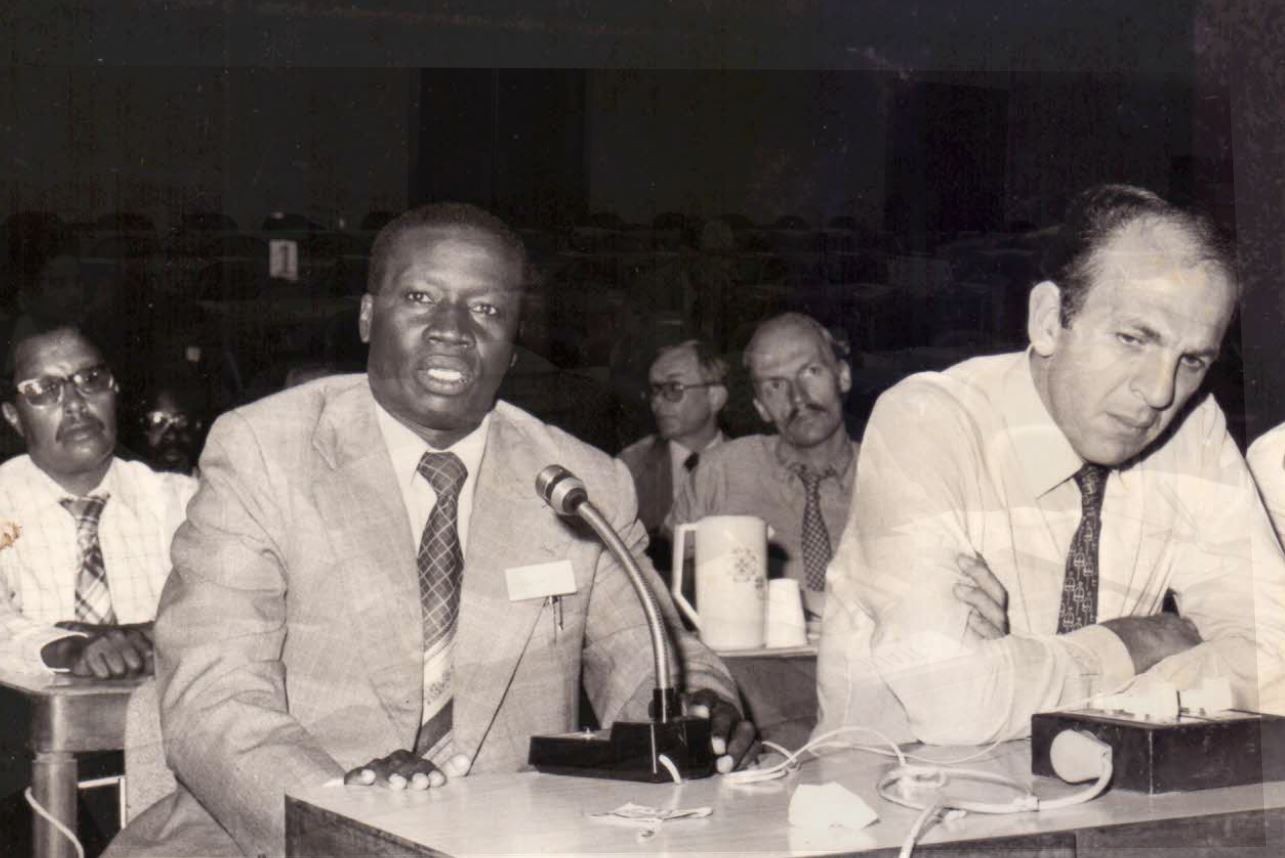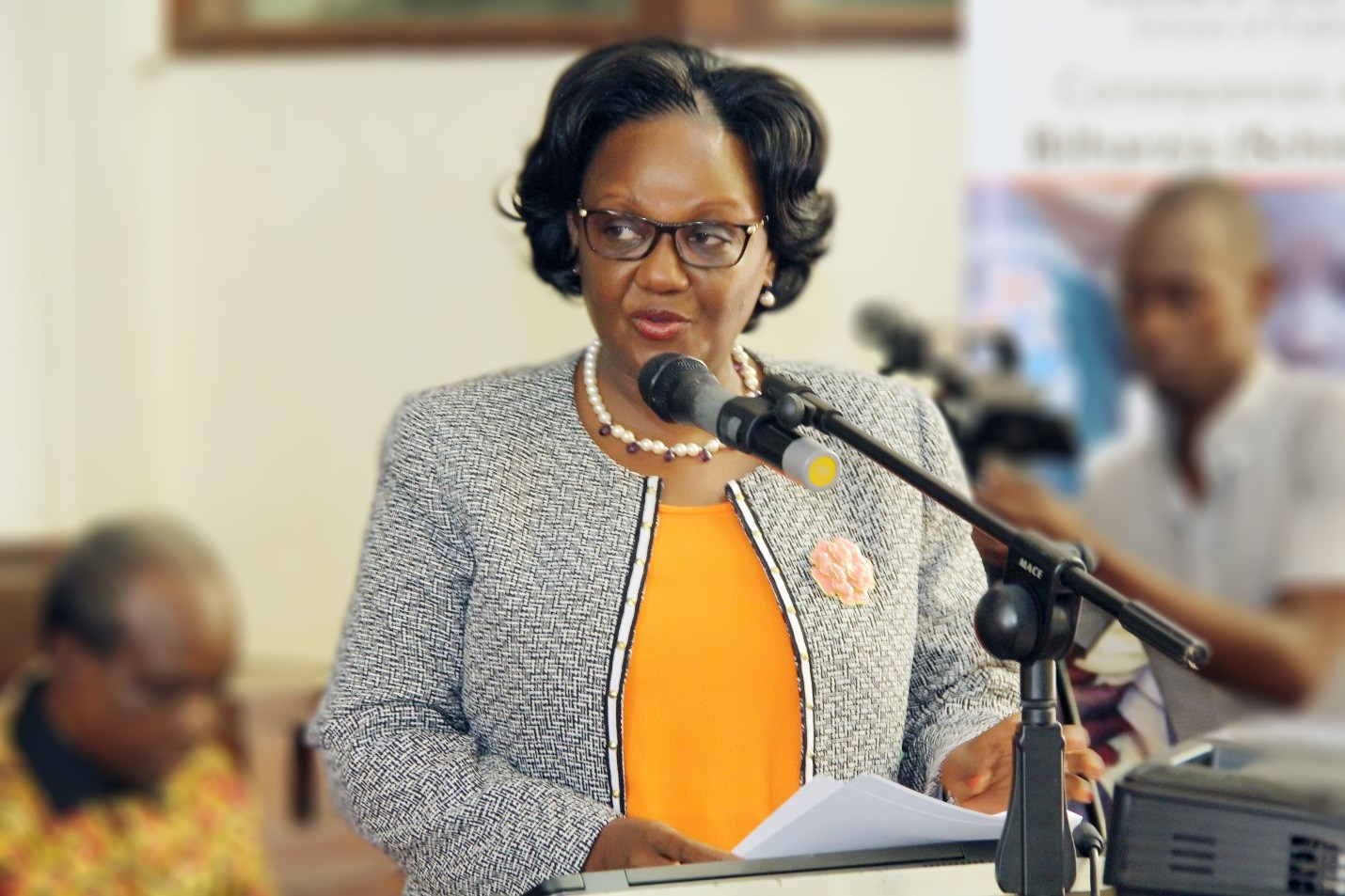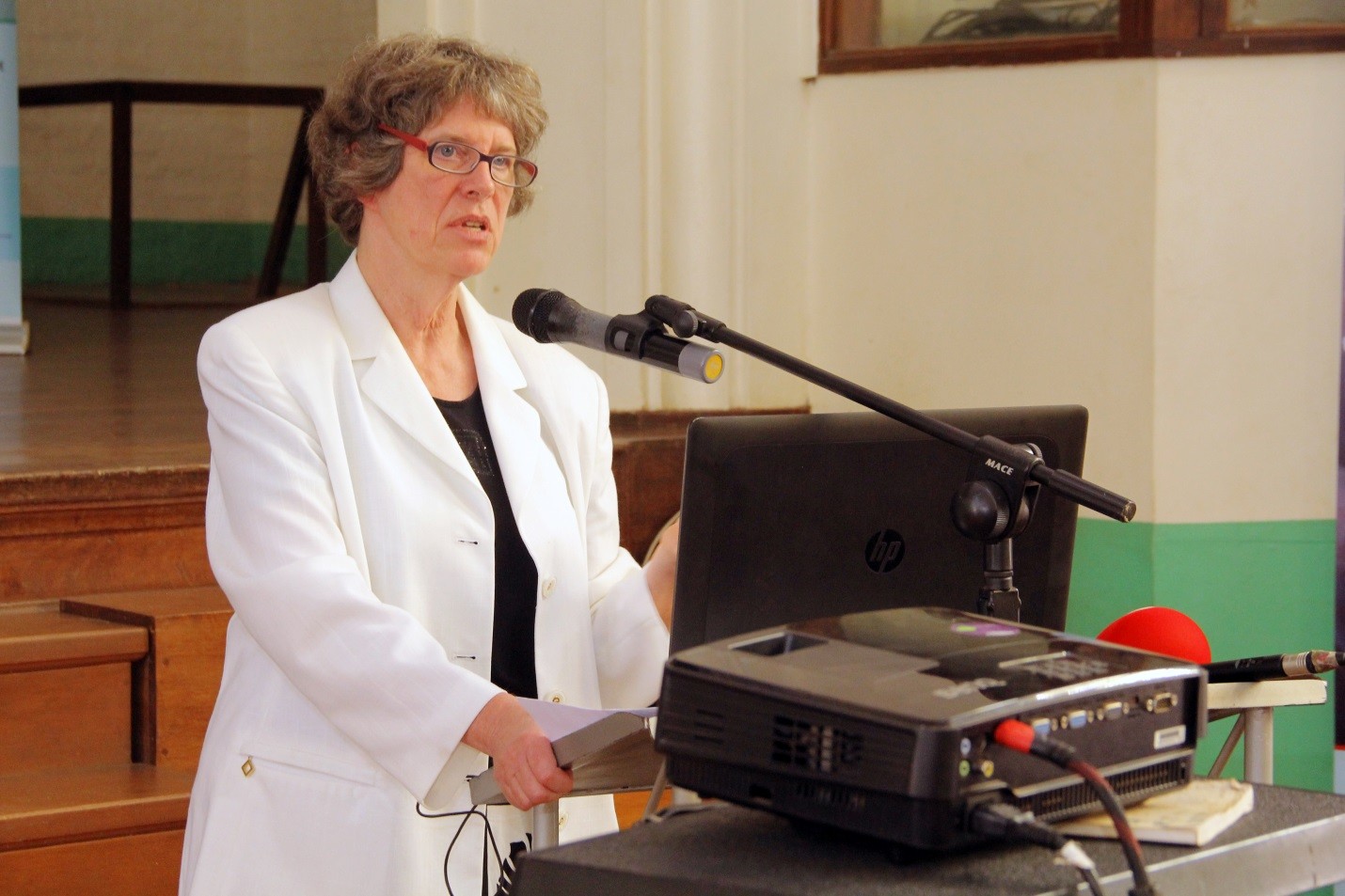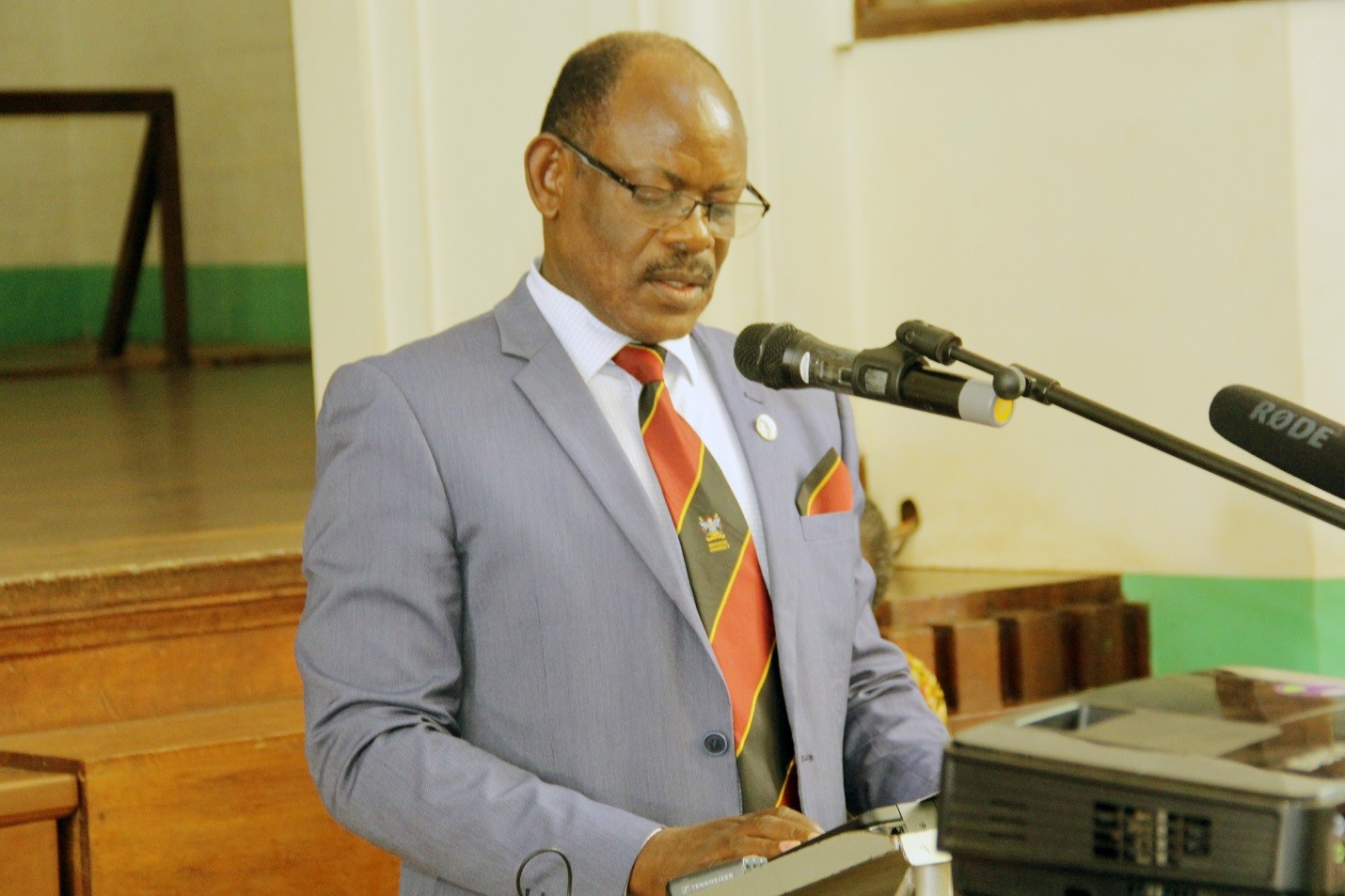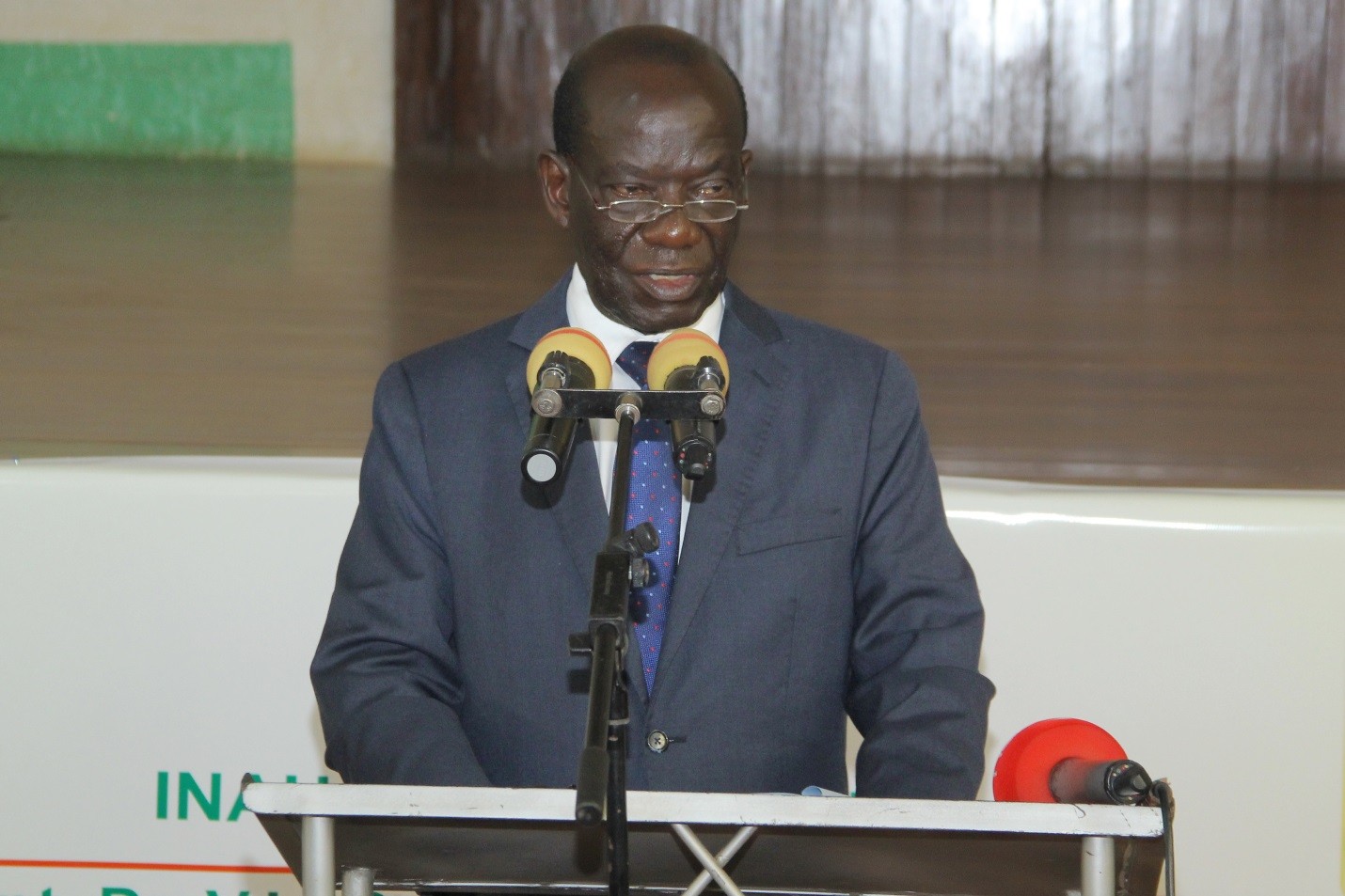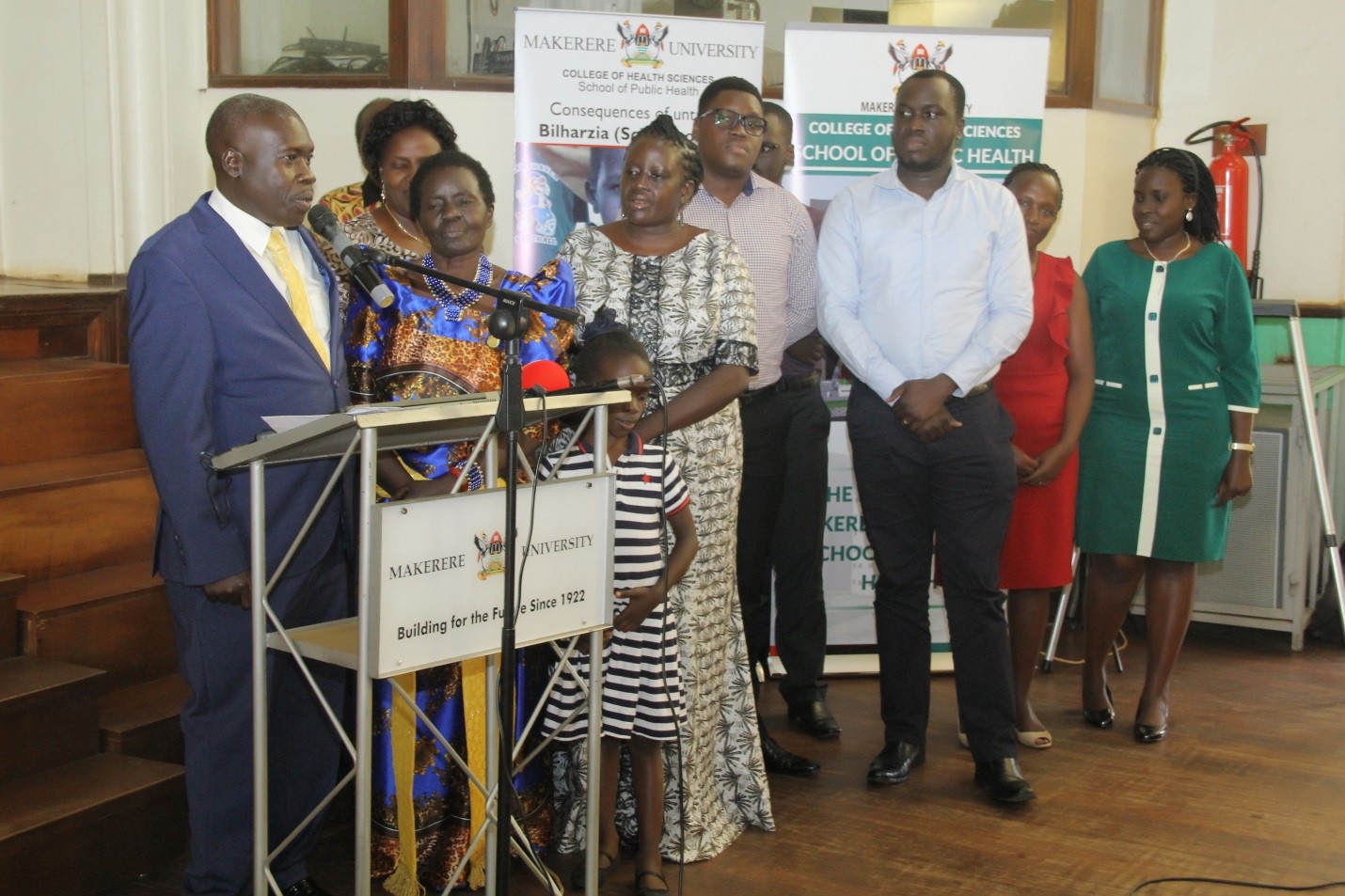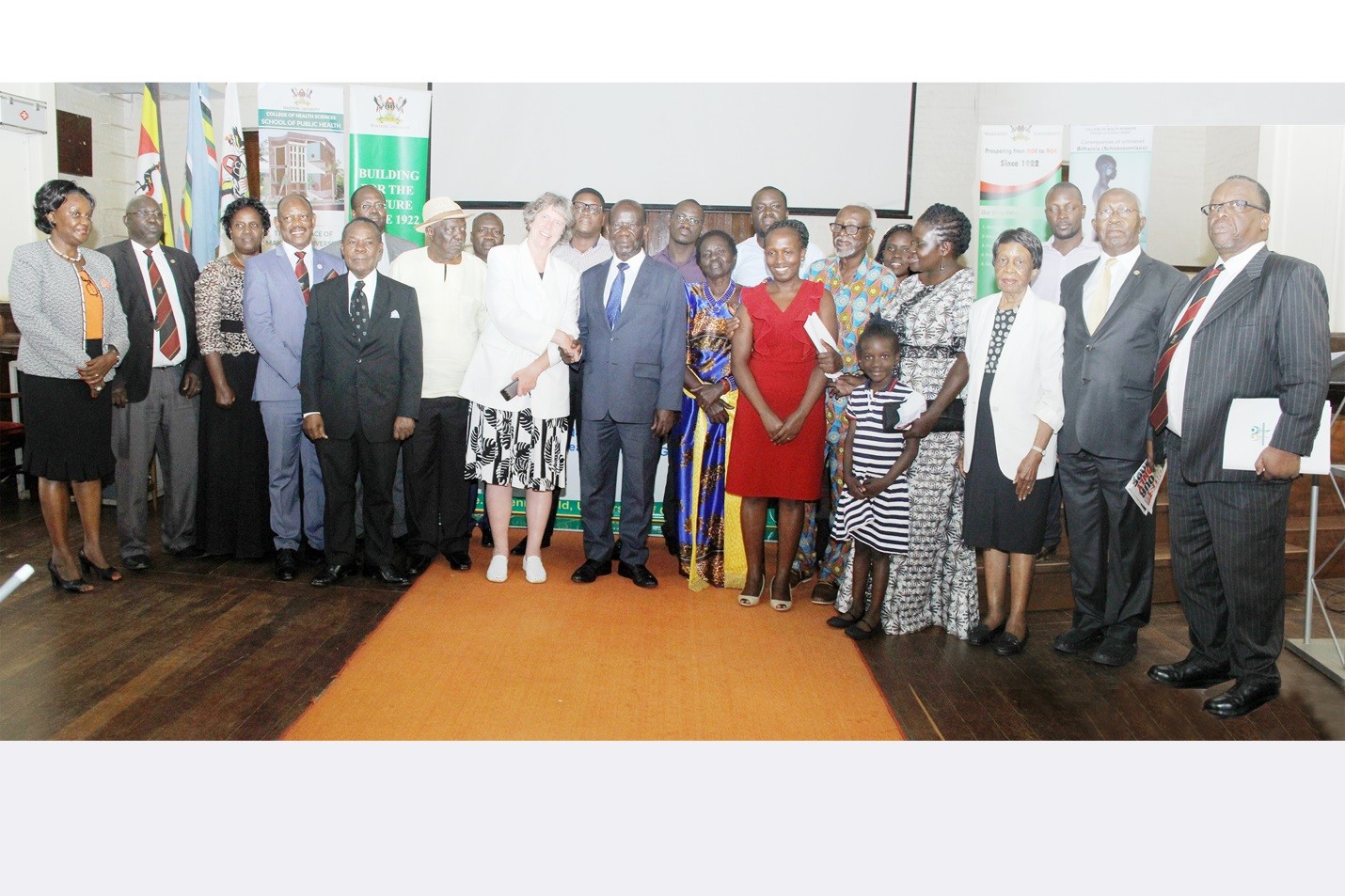
(Some of the high profile guests including the Vice President of Uganda, H.E Edward Ssekandiaudience at the Inaugural Memorial Lecture for the Departed Prof VL Ongom, the first African Head of the Institute of Public Health)
June 28th, 2018 started with a beehive of activity for the staff of Makerere University School of Public Health (MakSPH) that was organizing the Inaugural Memorial Lecture of Prof V.L. Ongom who was the first African Director of the Institute of Public Health, now MakSPH.
Prof Ongom was the Institute’s Director from 1975 to1980, when he passed on in Belfast, Northern Ireland due to a stroke. At the event, Prof Ongom was celebrated for his great contribution to science through his research in parasitology, especially in Bilharzia (Schistosomiasis). His ground-breaking study on Schistosomiasis has formed a strong framework that is used till today for research on the disease. The memorial lecture will be held annually.
Referred to as one of the Neglected Tropical Diseases (NTDs), Schistosomiasis usually does not attract as much interest from researchers because of underfunding. Lack of research interest in the disease is one of the reasons why till today, there is no recommended treatment for children under the age of 5 who are suffering from the disease according to Prof Rhoda Wanyenze, the current Dean of MakSPH. Even more appalling are the recent figures released at a National Schistosomiasis Dissemination which showed that the prevalence is at 29% for Ugandans above 2 years. Results also showed that the prevalence of Schistosomiasis among children between the ages of 2-4 years is at a shocking 42%.
It is upon this background that MakSPH at the same function launched an awareness and elimination campaign against Schistosomiasis (Bilharzia). Part of the campaign strategy is an Endowment Chair in the honour of Prof VL Ongom towards the elimination of Schistosomiasis and other NTDs by 2040 in line with Uganda Vision 2040. A healthy citizenry is a pre-requisite of human capital driven GDP growth.
In her welcome remarks, Dr Wanyenze, the Dean, explained that this Endowment Chair will be established towards accelerating research in Schistosomiasis. About the amount that MakSPH is looking to raise for this cause, she said, “The V.L Ongom Endowed Chair is targeting at least 2 million dollars by June 2019 and at least 15 million dollars by June 2024.”
Speaking about the seemingly huge amount that MakSPH is expecting to collect, Dr Wanyenze said that “investing in health is not an option; what counts is making a difference in the lives of the people we lead.’’
In the same welcome remarks, Dr Wanyenze also revealed that MakSPH has embarked on plans to build a new home at the Main Campus. This home is planned for completion in 2021with the intention of enhancing and establishing MakSPH as a regional hub for research.
On honouring Prof Ongom, she said, “as we grow, we have to always thank men who laid foundations for the school like Prof Ongom. I therefore honour Prof William Bazeyo, Prof Gilbert Bukenya , Prof John Kakitahi and Prof Josephine Nambooze for their outstanding and exemplary work at MakSPH,” referring to former Deans of MakSPH.
Giving her keynote address during the lecture that took place at Main Hall of Makerere University, Dr Birgitte J.Vennervald from the University of Copenhagen, in Sweden, revealed that Prof Ongom did research that proved the seriousness of schistosomiasis prevalence. She cited Prof Ongom’s Panyagoro Case Study with which he thrust into light his community and country and “he did not give up,” she added.
Citing the report released from the National Schistosomiasis Survey that showed Bilharzia prevalence rate at 29%, Dr Birgitte pointed out that the report is alarming. She cautioned everyone to be vigilant about schistosomiasis from the rich right to the marginalized local communities who are highly affected by the disease and called for treatment in all health centres. According to Dr. Birgitte, migration among fishermen, conflict and climate change still pose a serious challenge in the fight against Schistosomiasis. Dr Birgitte therefore urged Uganda to train more health workers and incorporate health studies in all school curriculums as an instrument in fighting Schistosomiasis and other NTDs. Despite all the challenges, Dr Birgitte commended MakSPH, Ministry of Health, the Uganda Peoples Defence Forces (UPDF) and Ugandan Researchers like Dr Peter Kibira, Dr Makumbi among others for being at the forefront in the fight to eliminate Schistosomiasis by 2040.
Government doing mass treatment campaigns for Bilharzia
Speaking on behalf of Ministry of Health under Vector Control Division, Dr Narcis Kabateraine could not hide his excitement about the genius that was Prof V.L Ongom.
He had this this to say, “It is amazing that even with the short time that Prof Ongom lived, he was able to write three research papers. I was shocked to realize a man like him had written about Bilharzia way back,” Dr Kabateraine stated delightfully adding that the Ministry of Health remains committed to treating Schistosomiasis
“We started mass treatment campaigns and we have been treating every year. However, it is not the drugs alone that can solve this issue because transmission is complex, we need everyone’s help.’’
Preventive annual or biennial mass treatment is one of the five prongs that according to Ministry of Health will lead to the elimination of Bilharzia in Uganda captured in an acronym PHASE with ‘P’ representing this prong. The other recommended approaches that have to be carried out alongside mass treatment include, Health education about sanitation. A is for making sure that there is Access to clean water, while S is for Sanitation improvement that includes construction of toilets and E is for Environmental management to control water snails which are the primary vectors by which bilharzia is spread.
The Vice Chancellor of Makerere University, Mak, Prof Barnabas Nawangwe also asked the audience at the lecture to emulate Prof Ongom who dedicated his life to treating and seeking for long term solutions to bilharzia.
“This public lecture therefore marks a beginning for a joint contribution by all stakeholders towards limination of schistosomiasis,” Prof Nawangwe said.
He added that that the Endowment Fund and Chairwill be instrumental in the fight against Neglected Tropical Diseases including Nodding Disease.
Prof Nawangwe also affirmed that Mak will always play a leadership role in the fight against Schistosomiasis and other research-related projects.
Representing the Principal of the College of Health Sciences (CHS) Prof Charles Ibingira, Prof Isaac Okullo, the Deputy Principal of CHS emphasized that “there is need for extra support to universities if bilharzia is to eliminated.”
He urged the government to put aside a budget for universities to research in order for them to solve health problems.
“If government can make a national budget that includes research, we will be glad,” Prof Okullo emphasized.
Presiding over the event, the Vice President of Uganda, His Excellency Edward Ssekandi expressed his gratitude and honour towards Prof V.L Ongom.
“Ongom had the energy of an army captain and he worked tirelessly in the service of the common man. He was also a catholic man who put faith to action,” the VP said.
He pointed out that it is hard to for society to work at full capacity if their health is poor while thanking Mak for choosing to remember fallen heroes like Prof V.L. Ongom for their contribution towards the health of society.
Hon Ssekandi said that this is a wakeup call to all stakeholders to work towards elimination of Bilharzia and nodding disease, and as part of government’s readiness, the Vice President pledged to meet MakSPH researchers. He thanked the Dr Wanyenze for eloquently executing her duties and pledged to meet and discuss proposals to eliminate Schistosomiasis with the MakSPH researchers with the purpose of changing lives of the citizens and solving real problems.
Mr Ssekandi also lauded MakSPH for its partnership with UPDF, Ministry Of Health and the soon-to-be renamed Pakwach Health Centre IV in Memory as Prof V.L Ongom Memorial Hospital.
He noted that the hospital will be a strategic hub in the West Nile and Northern Uganda for research, innovation and interventions centre towards the elimination of Bilharzia and other NTDs including Nodding Disease in the realization of Vision 2040.
Prof Ongom was eulogized by different speakers including the Former Prime Minister Kintu Musoke who was a former schoolmate and the Third Deputy Prime Minister Kirunda Kivejinja. The event was also attended by Omito Robert, the LCV Pakwach District, the top UPDF command in the field of health and the Late Prof V.L Ongom family led by his wife Cecilia among Others.
Biography
Prof Ongom was born on June 7th, 1933 in Panyagoro village in Pakwach district in Northern Uganda to Karlo Lachara and Milia Akweyo.
He went to St. Peters’ Junior Secondary School, Nsambya, to Police Children’s School, Nsambya, to Ngetta Primary School in Lira and to Entebbe Primary School in 1952.
He joined Namilyango College till 1955 from where he received a Madhvani Scholarship to the Royal Technical College in Nairobi, Kenya where he sat his GCE A-levels in 1958. After that, he was awarded another Madhvani Scholarship to India where he studied medicine and attained a pre-medical examination certificate from Delhi University. He received his Bachelors of Medicine and Bachelor of Surgery from Agra University, also in India in 1965.
After his internship at Mulago Hospital, he started his career in the army as a Captain before he became a Brigade Medical Officer. He started on and completed his Doctorate in Public Health in 1969.
In 1970, he went into academia as a lecturer in the Department of Preventive Medicine. He became a senior lecturer in 1971. He obtained a Master of Science (MSc) Degree in Parasitology from the University of London in 1972. He then went ahead to pursue and obtain a Doctorate of Medicine (MD) from Makerere University becoming an Associate Professor in 1974 and a full professor in 1975. In the same year, 1975, he became the first African Head of the Institute of Public Health.
Prof Capt Dr. Ongom made a great contribution to science through his research in parasitology especially in Bilharzia/Schistosomiasis and Sexually Transmitted Infections such as gonorrhea and syphilis. He published profusely with over 25 peer-reviewed publications in which he was the first author and overall had over 35 publications.
He is survived by a widow, Cecilia Ongom and seven children.


